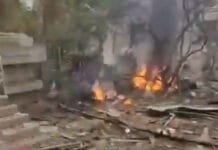Gaza City, October 20, 2025 — The fragile ceasefire between Israel and Hamas has shattered just days after it was brokered, as Israel resumed military operations in southern Gaza following what it called “serious violations” by Hamas militants. The renewed strikes have once again plunged the war-torn enclave into chaos, threatening regional stability and derailing ongoing diplomatic efforts.
According to Israeli Defense Forces (IDF) spokesperson Rear Admiral Daniel Hagari, Hamas “blatantly violated” the terms of the ceasefire by launching rocket attacks into Israeli territory late Sunday evening. “Israel will not tolerate breaches of the truce. Our operations will continue until the threat is neutralized,” Hagari told reporters in Tel Aviv.
Eyewitnesses in Rafah and Khan Younis described overnight explosions that rocked residential neighborhoods. Local health authorities reported dozens of casualties, while thousands of civilians rushed toward makeshift shelters. “We thought peace had finally returned, even if temporarily. Then the bombing started again,” said Noor Al-Masri, a Gaza resident sheltering at a UN-run school.
Ceasefire Hopes Fade Amid Mounting Violence
The short-lived truce, mediated by Egypt and Qatar with U.S. support, had raised hopes of a humanitarian pause allowing aid delivery and potential hostage negotiations. But by Monday morning, Israeli fighter jets had targeted multiple Hamas installations in Rafah, effectively ending the ceasefire.
The Hamas political bureau condemned Israel’s actions, calling them “a grave betrayal of the truce and an act of aggression.” In a statement released early Monday, the group said, “The resistance will respond firmly to every Israeli violation.”
Analysts fear that the collapse of the ceasefire could reignite a full-scale conflict, undoing weeks of painstaking diplomatic progress. “This was a crucial moment for de-escalation,” said Lina Khoury, a Middle East analyst at the Carnegie Center. “If both sides return to open conflict, humanitarian suffering will intensify beyond control.”
Humanitarian Crisis Deepens
Even before the renewed fighting, Gaza’s humanitarian situation was dire. The UN estimated that over 70% of Gaza’s 2.3 million residents were internally displaced, with critical shortages of food, water, and medical supplies. Hospitals, already operating under emergency conditions, now face renewed strain.
“The situation is catastrophic,” said Dr. Ahmed Al-Zarqa of Rafah Central Hospital. “We are treating the wounded with whatever limited resources we have. The electricity supply is erratic, and medicines are running out.”
The United Nations Relief and Works Agency (UNRWA) appealed for an “immediate cessation of hostilities” and urged both parties to allow the passage of humanitarian aid through the Rafah crossing, Gaza’s primary lifeline.
Global Reactions: Calls for Restraint
International reactions poured in throughout Monday. U.S. Secretary of State Antony Blinken expressed “deep concern” and urged both sides to return to the negotiating table. Egypt’s foreign ministry also condemned the violence, warning that continued escalation could trigger a regional spillover.
Meanwhile, the European Union issued a statement calling on Israel to exercise restraint and Hamas to cease attacks. “The safety of civilians must remain paramount,” said EU foreign policy chief Josep Borrell.
Across social media, #PrayForGaza began trending as humanitarian organizations renewed appeals for donations. “Every ceasefire collapse means more children lose their homes, schools, and sometimes their lives,” tweeted UNICEF’s Middle East director Adele Khoury.
Diplomatic Path Forward
Despite the violence, diplomatic channels remain partially open. Egyptian and Qatari envoys are reportedly in contact with both sides, attempting to salvage parts of the truce agreement. However, Israeli officials remain skeptical. “There can be no ceasefire with a group that uses it to reload rockets,” one senior Israeli source told Reuters.
Experts believe that without a stronger international mechanism to monitor ceasefire violations, any future truce will likely face the same fate. “The pattern is tragic but predictable,” said Khoury. “Ceasefires without accountability mechanisms are doomed to fail.”
Conclusion: Fragile Peace in Peril
As night falls on Gaza, plumes of smoke once again dominate the skyline. The optimism that briefly followed the ceasefire’s announcement has been replaced by fear and uncertainty.
With the humanitarian crisis worsening and political mistrust deepening, hopes for peace in Gaza appear more distant than ever. Yet amid the destruction, voices for peace persist. “We don’t need another war,” said 26-year-old teacher Mariam Hassan. “We just need the world to care enough to stop it.”















